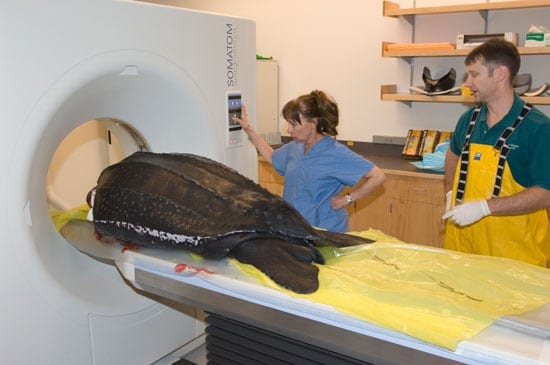Media Advisory: Turtle Skulls Prove to be Shock-Resistant
January 14, 2009
Scientists and engineers from Woods Hole Oceanographic Institution (WHOI) and the U.S. Navy have discovered that sea turtles’ skulls and shells not only protect them from predators but also from extraordinarily powerful underwater shockwaves. The research, originally intended to help the Navy avoid harming turtles, could also point the way to designing improved body armor and helmets for soldiers on land.
To test the safety of ship designs, the U.S. Navy conducts “ship shock” trials, setting off explosions near test vessels. Navy personnel must monitor the seas to ensure that marine mammals and sea turtles are not harmed. But at what distances should various species be considered safe from the effects of pressure and sounds waves from the explosions?
In the experiments, WHOI biologist Darlene Ketten, a team of WHOI and other blast trauma researchers, and Navy engineers meticulously attached pressure sensors to fresh carcasses of dolphins and sea turtles that died by stranding themselves on beaches. In this way, the unfortunate stranding deaths of animals serve to help protect living ones. At the Naval Undersea Warfare Center and Walter Reed Army Institute of Research in Maryland, test carcasses are subjected to blast pressures equivalent to different distances from an underwater explosion.
Quite surprisingly, sea turtle carcasses that received a 300-psi shockwave were astonishingly resistant. “That is an incredibly intense received pressure, like being fairly close to a major explosion,” Ketten said. “Yet we found a recorded pressure of only 15 psi inside the turtle’s lungs and only small regions of brain damage. Brain and lung damage appears to be prevented by the turtle’s own body armor.”
“Turtles are a wonderful system to model for improvements to body armor for humans,” Ketten said. “It’s a case of looking at something theoretical and seeing the practical side of it.”
For more on this story, please see the article in Oceanus magazine.
The Woods Hole Oceanographic Institution is a private, independent organization in Falmouth, Mass., dedicated to marine research, engineering, and higher education. Established in 1930 on a recommendation from the National Academy of Sciences, its primary mission is to understand the oceans and their interaction with the Earth as a whole, and to communicate a basic understanding of the oceans’ role in the changing global environment.

